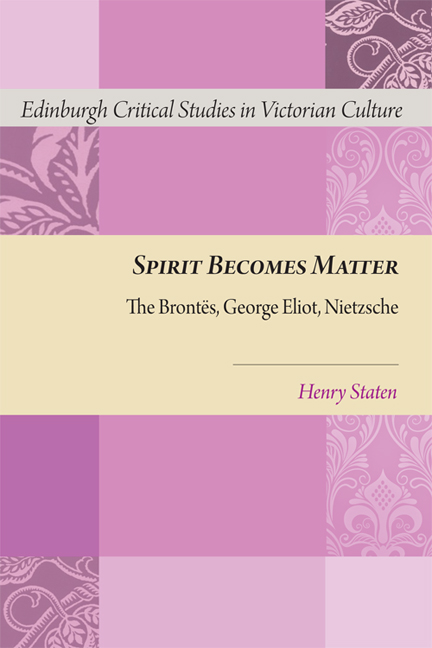Book contents
- Frontmatter
- Contents
- Series Editor's Preface
- Author's Preface
- Acknowledgements
- Dedication
- Introduction
- 1 The Poisoned Gift of Forgiveness (Jane Eyre)
- 2 Subincision of the Ethical Subject (Middlemarch)
- 3 What Things Cost in Middlemarch
- 4 The Return to the Heath (Wuthering Heights)
- 5 Spirit Becomes Matter
- Index
Introduction
Published online by Cambridge University Press: 05 August 2016
- Frontmatter
- Contents
- Series Editor's Preface
- Author's Preface
- Acknowledgements
- Dedication
- Introduction
- 1 The Poisoned Gift of Forgiveness (Jane Eyre)
- 2 Subincision of the Ethical Subject (Middlemarch)
- 3 What Things Cost in Middlemarch
- 4 The Return to the Heath (Wuthering Heights)
- 5 Spirit Becomes Matter
- Index
Summary
Victorian Physio-Psychology and Nietzsche
The night Jane Eyre, now an heiress, welcomes her cousins Diana and Mary back to Moor House from their exile as governesses, the celebration of their return is interrupted by a youth whose mother is dying, and who asks St John to come minister to her. The young women have been very happy celebrating, but this is not the kind of thing St John enjoys, and he has been restless; now, despite the fact that it is late, there is no road, and it is a bitter winter night, he readily agrees to go to the dying woman.
… he was already in the passage, putting on his cloak, and without one objection, one murmur, he departed. It was then nine o'clock; he did not return till midnight. Starved and tired enough he was: but he looked happier than when he set out. He had performed an act of duty; made an exertion; felt his own strength to do and deny, and was on better terms with himself.1
St John performs ‘an act of duty’, a moral act involving self-denial; but pragmatic Jane sees it as the physical working out of a physiological energy, with a corresponding moral-psychological effect. He has ‘made an exertion; felt his own strength to do and deny’, an exertion involving a long, difficult trek through a wintry countryside, and this has left him ‘on better terms with himself’. What is at work here in Charlotte Brontë's representation of St John is what Graeme Tytler, speaking of Wuthering Heights, has called ‘the assumption of man's close biological kinship with the animals’, with the corresponding tendency to understand human character and motivation in biologically grounded terms.
Another aspect of Charlotte Brontë's physio-psychological perspective is visible in Jane's evaluation of Mr Mason's physiognomy, in comparison with Rochester's:
For a handsome and not an unamiable-looking man, he repelled me exceedingly: there was no power in that smooth skinned face of a full oval shape, no firmness in that aquiline nose, and small, cherry mouth; there was no thought on the low, even forehead; no command in that blank, brown, eye.
- Type
- Chapter
- Information
- Spirit Becomes MatterThe Brontes, George Eliot, Nietzsche, pp. 1 - 30Publisher: Edinburgh University PressPrint publication year: 2014



